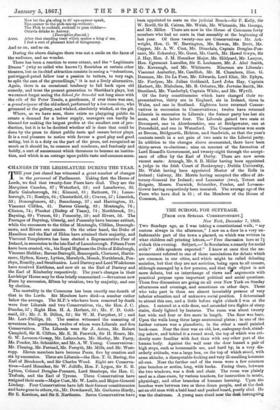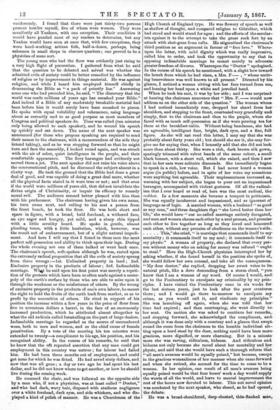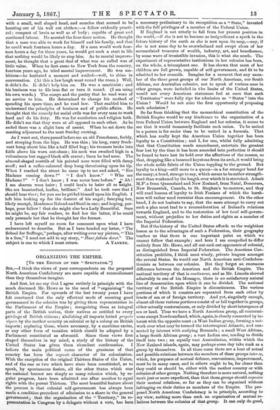'I'HE SCHOOL FOR SUFFRAGE.
[FROM OUR SPECIAL CORRESPONDENT.]
New York, December 7, 1866. Two Sundays ago, as I was taking a constitutional walk, "my custom always in the afternoon," I saw on a door in a very un- fashionable part of the town a placard, on which was written in what children call printing letters,—" Free discussion here at o'clock this evening. Subject,—' Is Secularism a remedy for social evils ?' Able speakers expected." I knew at once that the an- nouncement referred to one of those associations for debate which are common in our cities, and which might be called debating societies, but that they are not societies, being open to all comers, although managed by a few persons, and that thlir object is not mere debate, but an interchange of views Isar arguments with practical purpose upon important political and social questions. These free discussions are going on all over New York on Sunday afternoons and evenings, and sometimes on other days. Those who take part in them are almost invariably persons of very inferior education and of unknown social position. I determined to attend this one, and a little before eight o'clock I was at the place. I entered at a side door, and ascended two flights of steep stairs, dimly lighted by lanterns. The room was about twenty feet wide and four or five more in length. The floor was bare. Upon the walls hung three large anatomical plates ; in one of the farther corners was a pianoforte, in the other a small painted book-case. Near the door was an old, low, mahogany desk, stand- ing askew, and behind it a round stool, the top of which was evi- dently more familiar with feet than with any other part of the human body. Against the wall near the door leaned a pair of high steps, such as housemaids use, and hard by, in a very dis- orderly attitude, was a large box, on the top of which stood, with arms akimbo, a disreputable-looking and very ill-smelling kerosene oil-can. Near the farther end of the room were a few common pine benches or settles, long, with backs. Facing them, between the two windows, was a desk and chair. The room was plainly used as a class-room, by various teachers, for instruction in music, physiology, and other branches of humane learning. Upon the benches were between two or three dozen people, and at the desk sat an old man with a bald head and peaked beard, poorly clad. He was the chairman. A young man stood near the desk haranguing vociferously. I found that there were just thirty-two persons present besides myself, five of whom were women. They were manifestly all Yankees, with one exception. Their condition it would have puzzled most of my readers to determine, but any Yankee would have seen at once that, with few exceptions, they were hard-working artisan folk, half-a-dozen, perhaps, being salesmen in small shops in obscure quarters ; one proved to be a physician of some sort.
The young man who had the floor was evidently just rising to a very high flight of peroration. I gathered from what he said that the question to be debated and solved was whether the admitted evils of society could be better remedied by the influence of religion or by improvement in things material. He was against religion, and while I heard him employed himself chiefly in denouncing the Bible as "a pack of priestly lies." Answering some one who had preceded him, he said, "The discovery that the world was made millions of years ago has smashed your Bible." And indeed if a Bible of any moderately breakable material had been before him it would surely have been smashed to pieces. He spoke with equal volubility and vehemence, using language about as correctly and to as good purpose as most members of Congress and political speakers do. Time was called (ten minutes only being allowed to each speaker), and he wound his speech up quickly and sat down. The name of the next speaker was announced (for those who propose speaking are required to send their names to the chairman, with a memorandum of the side they intend taking), and as he was stepping forward so that he might turn and face the assembly, I looked round again, and was struck with the air of sober, quiet intelligence in the people, and their comfortable appearance. The fiery harangue had evidently not moved them a jot. The next speaker did not raise his voice above the conversational pitch, and he discussed the subject almost in a chatty way. He took the ground that the Bible had done a great deal of good, and was capable of doing a great deal more, whether all the physical facts stated in it were true or not ; and that even if the world were millions of years old, that did not invalidate the divine origin of Christianity, or impair its efficacy to remedy moral evil. The audience seemed better pleased with him than with his predecessor. The chairman having given his own name, his turn came next, and calling to his seat a person from the front bench, he took the floor. He was both short and spare in figure, with a broad, bald forehead, a withered face, an eye eager and hungry, yet mild, and a sharp chin tipped with a little scrubby beard. He spoke in gentle, almost pleading tones, with a little hesitation, which, however, was the result not of embarrassment, but of a slight natural impedi- ment. And here I will say that I found in these men the most perfect self-possession and ability to think upon their legs. During the whole evening not one of them balked or went back once. The chairman's speech, soft-spoken although he was, rested upon the extremely radical proposition that all the evils of society sprang from three wrongs :-1st. Unlimited property in land ; 2nd. Exclusive property in the products of labour ; 3rd. Indissoluble marriage. Whikt he said upon his first point was merely a repeti- tion of the protests which have been so often made against a mono- poly of the earth's surface by those who are able to seize upon it through the weakness or the misfortunes of others. By the wrong of exclusive property in the products of one's own labour, he meant the right to hold the fruits of the earth back from market, so as to profit by the necessities of others. He cited in support of his position the increase within a few years in the price of flour from five to seventeen dollars a barrel, in the face of an enormously increased production, which he attributed almost altogether to what the old radicals called forestalling on the part of large dealers. Indissoluble marriage he regarded as the source of unnumbered woes, both to men and women, and as the chief cause of female prostitution. By a vote of the meeting his ten minutes were extended to twenty—a compliment to his age, his position, and his recognized ability. In the course of his remarks, be said that he knew that the oft repeated assertion that any man could get employment in this country was untrue ; for labour had failed him. He had been three months out of employment, and could get none for which he was fitted. He had saved sixty dollars, and now that was all gone ; a day or two ago he had spent his last dollar, and he did not know where to get another, or how he should live during the coming week.
He resumed the chair, and was followed on the opposite side by a man who, if not a physician, was at least called "Doctor," and who had dark, wavy hair, disposed with studious negligence over a white forehead, dark eyes, and side whiskers, and who dis- played a kind of polish of manner. He was a Churchman of the High Church of England type. He was flowery of speech as well as shallow of thought, and compared religion to Gibraltar, which had stood and would stand forages; and the efforts of thesecular- ists against it to the attempt to take the great rock fort by an attack with shot-guns from rafts. He stigmatized the chairman's third position as an argument in favour of "free love." Where- upon the latter, with mild dignity which was really impressive, called him to order, and took the opportunity to say that in opposing indissoluble marriage he meant merely to advocate- greater freedom of divorce. Whereupon the "Doctor" apologized.. In the course of his speech he mentioned, with a slight bow toward the bench from which he had risen, a Mrs. F—, "whose untir- ing benevolence was well known to all present." Directed by his. glance, I noticed a woman sitting with her face turned from me,. and leaning her head upon a white and jewelled hand.
When he took his seat, it was by her side ; and I was surprised at hearing the chairman announce that "Mrs. F.— would now address us on the other side of the question." The woman whom. I had noticed immediately rose, dropped her shawl from her- shoulders, and stepping to the front, courtesied very gracefully au& simply, first to the chairman and then to the people, whom she- faced with as much self-possession as if she were pouring tea for- them at the breakfast-table. Without being handsome, she had an agreeable, intelligent face, bright, dark eyes, and a fine, full figure. As she will not read this letter, I may say that she was. probably about forty years old ; but should she see it, she may for- give me for saying that, when I honestly add that she did not look more than about thirty. She wore a rich, dark brown silk gown,. sparingly trimmed with velvet bands of the same colour, a smalls black bonnet, with a short veil, which she raised, and then I saw- that in her ears were solitaire diamonds. She immediately began to speak in a rich, low voice. But I had never heard a woman. argue (in public) before, and in spite of her voice my sensations- were anything but agreeable. Their unpleasantness increased as, warming with her subject, she began to pour out an impa.ssione& harangue, accompanied with violent gestures. Of all the radical- ism that I ever heard or read of, hers was the most radical, the- reddest. In a few moments she became a tempest in petticoats._ She was equally incoherent and impassioned, and as ignorant of language as of logic. A married woman, with a husband " as goods as any man," and three daughters thlt " she loved better than her- life," she would have "our so-called marriage entirely derogated, and men and women choose each other by a soul process, and promise- each other to live together as long as they loved and honoured each other, without any promise of obedience on the woman's side.- This," she cried, " is marriage that commends itself to my- mentality ; it commends itself to my soul ; it commends itself to my physic." A woman of property, she declared that every per- son without money who on asking for money was refused "ought to steal." Here the High-Church physician interrupted her by asking whether, if she found herself in the position she spoke of,. she would follow her own counsel, and take all the consequences- " My dear doctor," she replied, dropping her sweet voice to its. natural pitch, like a dove descending from a storm cloud, "you,. know that I am a woman of my word. Of course I would, ancil go to the Penitentiary to exculpate my criminality by my prin- ciples. I have visited the Penitentiary once in six weeks for the last sixteen years, just to look after the poor creatures. there ; and I would go there to-morrow to exculpate my crime, as you would call it, and vindicate my principles.' She was launching off again, when she was told that her time had expired ; and then courtesying, she went directly to- her seat. On motion she was asked to continue her remarks,. and stepping forward, she acknowledged the compliment, an& although it was done only with a courtesy and a glance that swept. round the room from the chairman to the humble individual sit- ting upon a hard stool by the door, nothing could have been more- gracious, more dignified, or more charming. But in a minute. more she was raving, ridiculous, hideous. And ridiculous and hideous not only because she raved about her mentality and her physic, and said that she would have such a thorough reform that "all men's avenues would be equally poised," but because, except in the gracious womanliness of her manner when she came forward and when she retired, she seemed for the time to cease to be a woman. In her opinion, one result of all men's avenues being equally poised would be that four hours' work a day would supply the wants of all the world, and leave to mental improvement the rest of the hours now devoted to labour. This not novel opinion was combated by the next speaker, who closed, as he had opened, the debate.
He was a broad-shouldered, deep-chested, thin-flanked man, with a small, well shaped head, and muscles that seemed to be bursting out of his well cut clothes ;—a fellow evidently practi- cal; compact of brain as well as of body ; capable of great and continued labour. He scouted the four-hour notion. He thought that a man was able to work for himself and his family, and that he could work fourteen hours a day. If a man would work four- teen hours a day for three years, he would get such a start in life that nothing would be likely to stop him. As to mental improve- ment, he thought that a great deal of what was so called was of little value. When he first came to New York from the country, fourteen years ago, he tried mental improvement. He was am- bitious—he hesitated a moment and smiled—well, to shine in conversation. (At this a low laugh went round the room.) Well, it didn't do. It didn't help him on. He was a machinist ; and his business was to file iron flat or turn it round. (I am using his own words.) The essays and the poetry that he read were of no service to him. He determined to change his method of spending his spare time, and he read law. That enabled him to understand the principles of business and of public affairs. He thought that the remedy for social evils was for every man to work hard and do his duty. He was for secularism and religion both. He didn't see that they were at all opposed to each other. As he ended there was a slight hum of assent. When he eat down the meeting adjourned to the next Sunday evening.
As I went out, there passed before me an old Frenchman, feebly, and stooping from the hips. He was thin ; his long, rusty frock- coat hung about him like a half filled bag ; his trousers broke into folds above his worn out-shoes ; his neck was swathed high in a voluminous but ragged black silk cravat ; linen he had none. The almond-shaped nostrils of his pointed nose were filled with damp snuff ; and a coffee-coloured drop hung threatening upon its tip. When I reached the street he came up to me and asked, " Eez Madame coming down ?" "I. don't know."" "Who eez
Madame ?" "I don't know ; I was never here before." Ah ! I am sharrm weez hairr ; I could leez'n to hairr all ze naight. She eez beauteefool, loatlee, brilliant." And he took care that I should hear the t; for you see he prided himself upon his English. I left him looking up for the descent of his angel ; fancying her, likely enough, Mesdames Roland and Staid in one; and hoping, per- haps, poor fellow ! that she might also be a Lady Bountiful. Sure he might be, my fair readers, to find her the latter, if he could only persuade her that he thought her the former.
I have left myself no room for comment upon what I have endeavoured to describe. But as I have headed my letter, "The School for Suffrage," perhaps, after writing over my picture, "This is a lion," I need not add to my story, " liaec fabula docet." The subject is one to which I must return. A YANKEE.






































 Previous page
Previous page